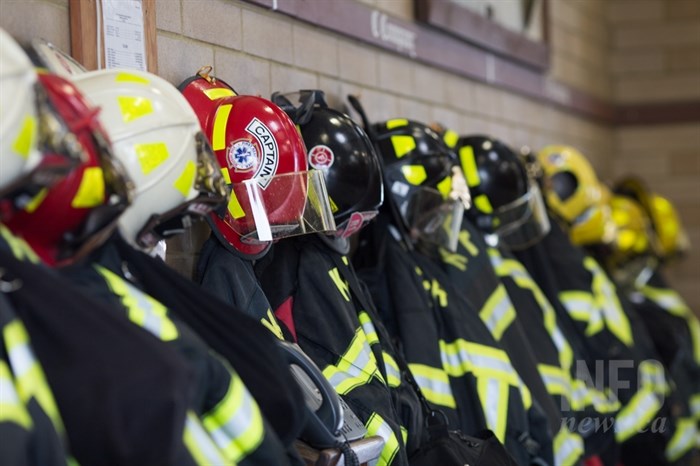
FILE PHOTO
(KIM ANDERSON / iNFOnews.ca)
October 04, 2020 - 9:49 AM
At one time, Peachland’s Fire Department had a waitlist for on-call firefighters but over the last 10 years the department has been struggling to reach its full numbers.
It’s the same in Lumby, and Kelowna’s more rural McKinley fire hall, but is something that is a North American-wide problem.
There were 152,650 local firefighters in Canada, from 2014-2016, and 83 per cent are volunteer firefighters. In rural communities with populations less than 50,000, firefighters are more likely to be volunteers, according to the National Fire Protection Association.
READ MORE: West Kelowna is looking to hire dozens of firefighters
Peachland’s Fire Department has been trying to maintain around 35 to 37 members, said fire chief Dennis Craig.
“Peachland is a bedroom community. There’s little industry and work in Peachland so everyone works out of town in West Kelowna, Kelowna and Penticton,” he said. Craig has been involved with the fire department for 20 years.
The district's median age is older than 50 which makes it a challenge for Peachland’s fire hall to find younger recruits, he said. The department's average age is much younger, around 33, but many aspiring firefighters get their start in Peachland, and then leave, meaning a high turnover rate for the hall.
“In usually about three to five years they look to get hired in big-city departments,” Craig said.
The workforce that they target with trades experience is also now working up north, meaning there are fewer people to choose from, he said.
Also younger parents working full time and balancing life with children may mean they don’t have time to volunteer at the hall.
“We’re a busy hall, it’s almost a call a day in some cases and they don’t have time to commit to the interruptions,” he said.
READ MORE: Faster response times means better firefighting in Kelowna’s north end
The fire hall has been posting recruitment ads in fitness centres in West Kelowna and parking at hardware stores on the weekends to attract that younger demographic.
“Yes, there is a concern. If I look 20 years down the road, what is the volunteer world going to look like?” Craig said, adding that other volunteer associations are competing for a limited pool of people.
“We haven’t been able to get our numbers consistently up, we haven’t been able to get a waiting list in the last 10 years, so I do worry a little bit.”
And he doesn’t see an answer in paid-full time firefighters.
“The tax base can only support so much and even our call volume, we just don’t have, to say you have two full-time people, each person is over $80,000 a year and that’s before benefits… and what does each full-time person give you? It’s not enough to fight a house fire, you still need a crew of 15 to show up to fight that house fire.”
Peachland’s department is trying to offer perks with the job, like free gym memberships to the district’s fitness centre and trying to figure out ways to offer healthcare benefits that recruits might not have otherwise, he said.
It’s the same story in Lumby and Kelowna.
“It’s been challenging but it’s getting worse. It’s recruitment and retention that gets more and more challenging all the time,” said Lumby fire chief Tony Clayton.
The hall likes to have between 20-30 on-call firefighters and is currently sitting at 20. Clayton can’t point a finger at the cause for fewer volunteers.
Financially, it wouldn’t be feasible for Lumby to pay all 20 firefighters as full-time employees, he said.
“I wouldn’t even want to look into a crystal ball on that. It’s not just B.C. that’s having the problem, it’s North American wide,” he said.
Kelowna’s department has both career and paid-on-call firefighters and still has challenges with finding paid-on-call members, said Kelowna Professional Firefighters Association president Troy Mamchur.
Mamchur started as a paid-on-call firefighter in McKinley’s fire hall 15 years ago.
It’s tough because you’re asking people to leave a job at a moment’s notice for another one that’s dangerous, he said.
“It’s a huge risk for a little bit of pay and way to support community,” he said.
A highrise fire requires 42 members within an eight-minute response, which is currently a number that Kelowna can’t meet, he said. Mamchur believes that more taxes should go towards supporting the fire service as the community continues to grow.
Changes to paid-on-call training mean increased training requirements and a bigger time commitment, he said.
“Even in McKinley here, at even one point there might be no one able to respond. So I think as municipalities expand, paid on-call firefighters become less effective because they may not be in the area (as they may be working other jobs.)”
For supporting the rural communities, he doesn’t have an answer.
“McKinley is a relatively small community. When I moved in I was still in my late 20s, early 30s and I was actually an elementary school teacher prior to getting into the service,” he said, “Again, the paid-on-call department here lost me because I went on as a career.”
To learn more about volunteering with the fire halls, contact your local fire department.
To contact a reporter for this story, email Carli Berry or call 250-864-7494 or email the editor. You can also submit photos, videos or news tips to the newsroom and be entered to win a monthly prize draw.
We welcome your comments and opinions on our stories but play nice. We won't censor or delete comments unless they contain off-topic statements or links, unnecessary vulgarity, false facts, spam or obviously fake profiles. If you have any concerns about what you see in comments, email the editor in the link above.
News from © iNFOnews, 2020